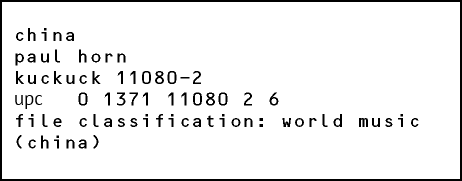

the project
Paul Horn's
China will appeal to a wide ranging audience. Lovers
of new age meditative styles, traditional jazz, and Eastern melodies
will all find something delightful and joyous in this recording. The
listener will be charmed not only by Paul Horn's famous silver flute,
but also by several traditional Chinese instruments superbly played
by
David Mingyue Liang. One of these instruments, the
ch'in, is a seven stringed bridged zither that has historically
been the instrument of philosophers and the literati such as
Confucius.
The
sheng is another unusual instrument heard on this recording
and consists of a bowl-shaped wind chamber of wood or metal, with a
short blowpipe extended out from the side and seventeen bamboo pipes
of varying lengths. According to legend, this pipe arrangement represents
the folded wings of the mythical bird, the phoenix.
Like the phoenix, Chinese music has survived to rise time and time
again from the ashes of a country fraught with political turbulence.
Paul Horn thus decided to capture this powerful music on his trip
to The People's Republic of China in 1978. Part of the release was
recorded in the Temple of Heaven outside the Forbidden City, but Horn
soon realized that "the new China was outside not inside."
Therefore, he started to perform in the streets of small villages,
even playing at the spur of the moment in Canton, at the Peoples'
Cultural Park to a crowd of five thousand people.
the artist
Paul Horn completed his undergraduate studies at the Oberlin Conservatory
of Music and his graduate studies at the Manhattan School of Music before
becoming a member of
Chico Hamilton's mid-1950s jazz
quintet. He has led his own groups ever since. Horn has won two Grammy
awards and traveled to India in the mid 1960s where he studied with
Maharishi Mahesh Yogi. In 1970, he moved to Victoria,
British Columbia, and has since performed and recorded throughout the
world, including Egypt, India, Scotland, and the Soviet Union.
David Mingyue Liang was born in China in 1941 and
was trained in Chinese classical music at an early age. He arrived
in the United States in 1964, and undertook graduate studies in ethno-musicology
and composition at the University of California in Los Angeles, culminating
in a Doctor of Philosophy degree. Since then, he has achieved international
recognition as a sino-musicologist, composer, and performer of
various Chinese musical instruments.




